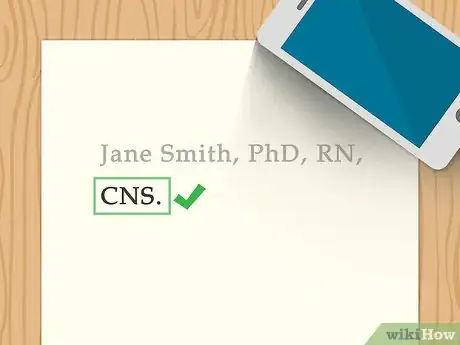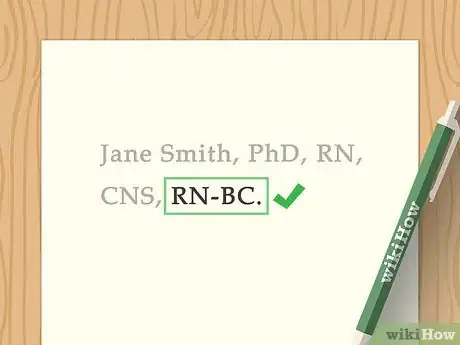This article was co-authored by wikiHow staff writer, Amy Bobinger. Amy Bobinger has been a writer and editor at wikiHow since 2017. She especially enjoys writing articles that help people overcome interpersonal hurdles but frequently covers a variety of subjects, including health and wellness, spirituality, gardening, and more. Amy graduated with a B.A. in English Lit from Mississippi College in 2011 and now lives in her hometown with her husband and two young sons.
This article has been viewed 31,657 times.
Learn more...
Trying to sort out the alphabet soup behind a nurse’s name can be difficult, but all those letters actually have a very specific meaning. These are the credentials which indicate a nurse’s education and training, and they should always be written in a set order.
Steps
Listing Credentials Correctly
-
1Separate the nurse's name and each credential with a comma. A comma should immediately follow the nurse’s name, with commas separating each credential. Do not use periods in the acronyms. For instance, you would write RN, not R.N.[1]
-
2Start by listing the highest degree earned. Credentials should be listed in order of permanence. Since degrees are only taken away in the most extreme cases, the first credential should always be the nurse’s highest degree. For example, if nurse Jane Smith has earned a doctoral degree, her credential would begin “Jane Smith, PhD.”[2]
- Include a baccalaureate degree unless the nurse has completed any higher education.
Advertisement -
3Follow the education credential with the nurse’s licensure. Licenses are permanent except in cases of extreme professional misconduct, so they should follow immediately behind the education level. It’s required that nurses list their license behind their names when filling out prescriptions or medical charts. This might be RN (Registered Nurse), LPN (Licensed Practical Nurse), NP-C (Certified Nurse Practitioner), or APRN, BC (Advanced Practice Registered Nurse, Board Certified).[3]
- If Nurse Smith is a Registered Nurse, her certification to this point should read “Jane Smith, PhD, RN.”
-
4Write any state designations or specialties next. These indicate that the nurse has the authority to practice more advanced medicine within a state. These might include NP (Nurse Practitioner), CNS (Clinical Nurse Specialist), and APRN (Advanced Practice Registered Nurse). Not all nurses will have this designation.[4]
- Nurse Smith has completed the licensing requirement in her state to be a Clinical Nurse Specialist, so her credentials now read “Jane Smith, PhD, RN, CNS.”
-
5Follow the state designation with any national certifications. Certifications usually have to be renewed, so they come near the end in order of permanence. A national certification is obtained through an accredited organization and might include RN-BC (Registered Nurse-Board Certified), FNP-BC (Family Nurse Practitioner-Board Certified), CCRN (Critical Care Registered Nurse), or NEA-BC (Nurse Executive Advanced-Board Certified).[5]
- Since Nurse Smith has completed the requirements with the American Nurses Credentialing Center (ANCC) to be board-certified as a Registered Nurse, her credentials would read “Jane Smith, PhD, RN, CNS, RN-BC.”
-
6End the credentials with any awards and honors followed by non-nursing certifications. Awards and honors might include recognition such as the distinguished FAAN, or Fellow of the American Academy of Nursing, which is given to nurses who have made outstanding contributions to the health and nursing field. Other fellowships would be listed here as well. Finish with non-nursing certifications, such as EMT.[6]
- Nurse Smith was recently awarded the FAAN, but she has no non-nursing certifications, so her final credentials will appear as “Jane Smith, PhD, RN, CNS, RN-BC, FAAN.”
Listing Credentials of the Same Type
-
1List the highest education degree first. You would usually not include a lower degree unless it is in a different field and relevant to the nurse’s work. For instance, if a nurse with a PhD works in an administrative capacity and has a graduate degree in business, you might write their credentials as “PhD, MBA.”[7]
-
2List the highest non-nursing degree followed by the highest nursing degree. For example, if a nurse has a master’s degree in business administration as well as a Master of Science in Nursing, the credential would read MBA, MSN.[8]
-
3List nursing certifications in either order of relevance or chronological order. If a nurse has completed multiple certifications, the order in which they are written is a matter of preference. They can either be listed in order of relevance to the nurse’s profession or in the order in which they were obtained.[9]
References
- ↑ https://nurseslabs.com/nurses-guide-display-credentials/
- ↑ https://nurseslabs.com/nurses-guide-display-credentials/
- ↑ https://www.nurse.com/blog/2020/04/21/whats-the-right-way-to-list-nursing-credentials/
- ↑ https://nurse.org/articles/displaying-your-nursing-credentials/
- ↑ https://www.nurse.com/blog/2020/04/21/whats-the-right-way-to-list-nursing-credentials/
- ↑ https://www.nursingworld.org/~48fdf9/globalassets/certification/renewals/how-to-display-your-credentials
- ↑ https://nurseslabs.com/nurses-guide-display-credentials/
- ↑ https://www.nursingworld.org/~48fdf9/globalassets/certification/renewals/how-to-display-your-credentials
- ↑ https://www.nursingworld.org/~48fdf9/globalassets/certification/renewals/how-to-display-your-credentials
About This Article
If you’re trying to figure out the order for writing a nurse’s credentials, keep in mind that they should be listed in order of permanence. Degrees are almost never revoked, so they come first. The nurse’s license comes next, followed by state designations, since these are only revoked in cases of serious misconduct. Certifications follow, since they usually have to be renewed periodically, and awards come at the end since they are voluntary. Keep reading to learn how to list multiple credentials of the same type!














-Step-12-Version-2.webp)

-2.webp)




















































Medical Disclaimer
The content of this article is not intended to be a substitute for professional medical advice, examination, diagnosis, or treatment. You should always contact your doctor or other qualified healthcare professional before starting, changing, or stopping any kind of health treatment.
Read More...